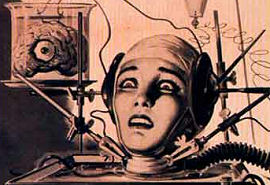25 June 2012
Experiment reveals workings of Freudian unconscious
by Will Parker
 New experimental findings show a causal link between unconscious conflict and the conscious symptoms experienced by people with anxiety disorders, lending scientific weight to one of Sigmund Freud's key theories. Howard Shevrin, emeritus professor of psychology in the University of Michigan Department of Psychiatry, presented his research last week at the 101st Annual Meeting of the American Psychoanalytic Association.
New experimental findings show a causal link between unconscious conflict and the conscious symptoms experienced by people with anxiety disorders, lending scientific weight to one of Sigmund Freud's key theories. Howard Shevrin, emeritus professor of psychology in the University of Michigan Department of Psychiatry, presented his research last week at the 101st Annual Meeting of the American Psychoanalytic Association.
For over 40 years, Shevrin has been looking for evidence that Freudian concepts such as the "unconscious" and "repression" could be documented through physical measures of brain activity. His work has explored the territory where neurobiology, thoughts, emotions and behavior meet.
The new experiment involved 11 people with anxiety disorders who each received a series of psychoanalytically oriented diagnostic sessions conducted by a psychoanalyst. From these interviews, the psychoanalysts inferred what underlying unconscious conflict might be causing the person's anxiety disorder.
Words capturing the nature of these unconscious conflicts were then selected from the interviews to be used as stimuli in the laboratory. The researchers also selected words related to each patient's experience of anxiety disorder symptoms.
These stimuli were then presented to the subjects subliminally at one thousandth of a second, and supraliminally at 30 milliseconds. A control category of stimuli was also added that had no relationship to the unconscious conflict or anxiety symptom. While the stimuli were presented to the patients, scalp electrodes recorded the brain's responses to them. Specifically, Shevrin examined alpha wave frequencies of around 8-13 cycles per second, which have been shown to inhibit various cognitive functions. Next, the unconscious conflict stimuli were presented immediately prior to the conscious symptom stimuli and a new measurement was made.
Shevrin reported that highly significant correlations (suggesting an inhibitory effect) were obtained when the amount of alpha generated by the unconscious conflict stimuli were correlated with the amount of alpha associated with the conscious symptom alpha - but only when the unconscious conflict stimuli were presented subliminally. No results were obtained when control stimuli replaced the symptom words. The fact that these findings are a function of inhibition suggests that from a psychoanalytic standpoint that repression might be involved.
Shevrin contends that the findings show that fundamental psychoanalytic concepts can be tested in empirical ways. "These results create a compelling case that unconscious conflicts cause or contribute to the anxiety symptoms the patient is experiencing," he noted. "These findings and the interdisciplinary methods used - which draw on psychoanalysis, cognitive psychology, and neuroscience - demonstrate that it is possible to develop an interdisciplinary science drawing upon psychoanalytic theory."
Related:
Discuss this article in our forum
Capitalism on the couch: psychoanalyzing the credit crisis
Can There Really Be More To Life Than Sex?
Humans drawn to high emotion
Mind-reading through the eyes
Source: University of Michigan Health System
